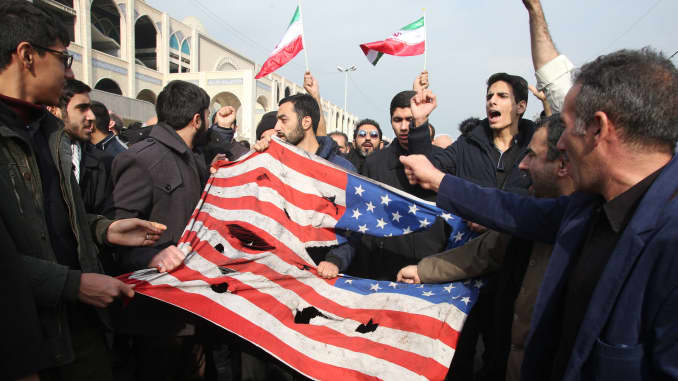
Iranians tear up a US
flag during a demonstration in Tehran on January 3, 2020 following the
killing of Iranian Revolutionary Guards Major General Qasem Soleimani in
a US strike on his convoy at Baghdad international airport.
Atta Kenare | AFP | Getty Images
https://www.cnbc.com/2020/01/03/dow-futures-after-us-air-strike-kills-iran-top-military-leader.html
Stocks fell sharply on Friday after the U.S.
confirmed that an airstrike killed Iran’s top military commander,
sending oil prices surging and hiking geopolitical concerns.
The Dow Jones Industrial Average plunged 212 points, or 0.8%. The S&P 500 slid 0.8% along with the Nasdaq Composite. The Dow briefly dropped more than 360 points at the open.
U.S. crude oil futures shot up around 3.5% to $63.31 per barrel, raising concerns about an energy shock on the global economy. Airline stocks fell broadly on the threat of higher oil prices. United, American and Delta all dropped more than 2%.
“Global oil markets will be volatile for weeks to come,” said Greg Valliere, chief U.S. policy strategist at AGF Investments, in a note. “There’s a reason, finally, for caution in the stock market.”
“Eventually there will be an uneasy truce ... But that’s a long, long way off; this will get worse before it gets better,” he added.
Investors largely fled risk assets such as stocks in favor of gold and Treasurys and other traditional safe havens. Gold futures jumped 1.3% to $1,547.80 per ounce. The benchmark 10-year Treasury yield, which moves inversely to the price, dropped to around 1.83%.
The Cboe Volatility Index (VIX), widely considered to be the best fear gauge on Wall Street, traded about 2 points higher, or 18.4%, at 14.77.
Energy stocks were the lone winner on Friday. The Energy Select Sector SPDR Fund (XLE) rose more than 1%. Concho Resources and Marathon Oil rose more than 2% each while Apache jumped traded more than 1.5% higher.
The Dow Jones Industrial Average plunged 212 points, or 0.8%. The S&P 500 slid 0.8% along with the Nasdaq Composite. The Dow briefly dropped more than 360 points at the open.
U.S. crude oil futures shot up around 3.5% to $63.31 per barrel, raising concerns about an energy shock on the global economy. Airline stocks fell broadly on the threat of higher oil prices. United, American and Delta all dropped more than 2%.
“Global oil markets will be volatile for weeks to come,” said Greg Valliere, chief U.S. policy strategist at AGF Investments, in a note. “There’s a reason, finally, for caution in the stock market.”
“Eventually there will be an uneasy truce ... But that’s a long, long way off; this will get worse before it gets better,” he added.
Investors largely fled risk assets such as stocks in favor of gold and Treasurys and other traditional safe havens. Gold futures jumped 1.3% to $1,547.80 per ounce. The benchmark 10-year Treasury yield, which moves inversely to the price, dropped to around 1.83%.
The Cboe Volatility Index (VIX), widely considered to be the best fear gauge on Wall Street, traded about 2 points higher, or 18.4%, at 14.77.
Energy stocks were the lone winner on Friday. The Energy Select Sector SPDR Fund (XLE) rose more than 1%. Concho Resources and Marathon Oil rose more than 2% each while Apache jumped traded more than 1.5% higher.
The U.S. announced late Thursday that it had killed Iran’s top commander, Gen.
Qasem Soleimani, in Baghdad in an airstrike. Soleimani had been a key
figure in Iranian politics, and his death has raised concerns over a
potential retaliation from the Iranian forces.
Iranian Foreign Minister Mohammad Javad Zarif warned on Friday that Iran would retaliate against the U.S. for its actions.
“It’s a game-changer,” Dryden Pence, chief investment officer at Pence Wealth Management, told CNBC’s “Squawk Box” on Friday. “We now have vast, broader array of weapons systems that the president has at his disposal. We’ve been able to weaponize economic sanctions now where we can go after individuals … but now I think the ultimate sanction that the president is able to use is an airstrike.”
Pence added, however, that any market volatility “will be short-lived.”
Wall Street loaded up on safer assets on fears that an oil spike might spark a recession. That risk is also heightened by the fact that the global economy has been struggling amid a global manufacturing slowdown.
The market moves come after U.S. equities rose to all-time highs on Thursday on the back of a strong performance in the tech sector. However, the optimism entering the new year seems to be fading amid political tensions, including North Korea and the impeachment of President Donald Trump.
Iranian Foreign Minister Mohammad Javad Zarif warned on Friday that Iran would retaliate against the U.S. for its actions.
“It’s a game-changer,” Dryden Pence, chief investment officer at Pence Wealth Management, told CNBC’s “Squawk Box” on Friday. “We now have vast, broader array of weapons systems that the president has at his disposal. We’ve been able to weaponize economic sanctions now where we can go after individuals … but now I think the ultimate sanction that the president is able to use is an airstrike.”
Pence added, however, that any market volatility “will be short-lived.”
Wall Street loaded up on safer assets on fears that an oil spike might spark a recession. That risk is also heightened by the fact that the global economy has been struggling amid a global manufacturing slowdown.
The market moves come after U.S. equities rose to all-time highs on Thursday on the back of a strong performance in the tech sector. However, the optimism entering the new year seems to be fading amid political tensions, including North Korea and the impeachment of President Donald Trump.
No comments:
Post a Comment